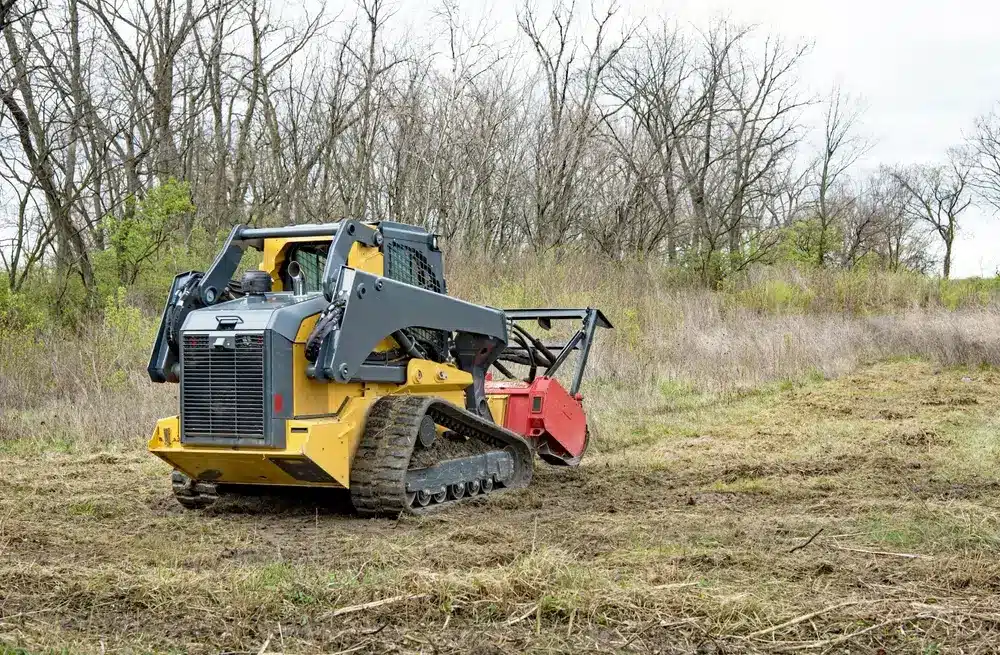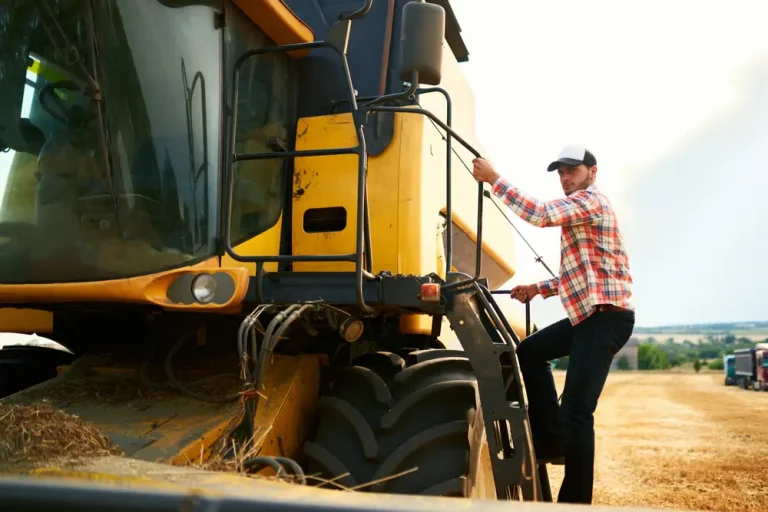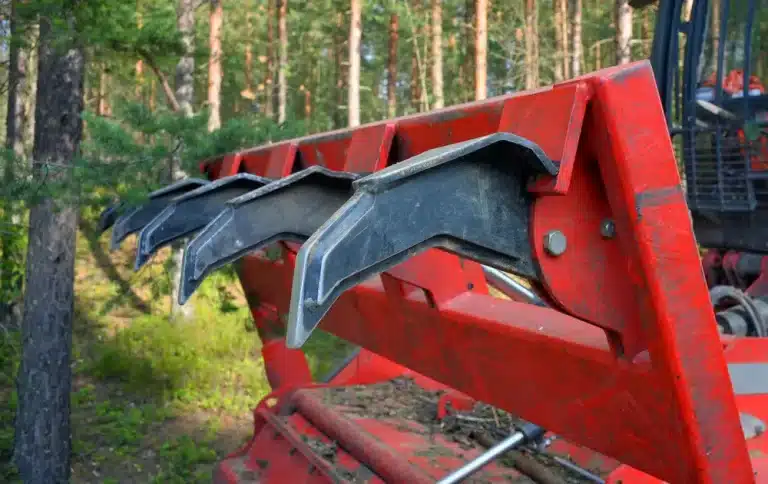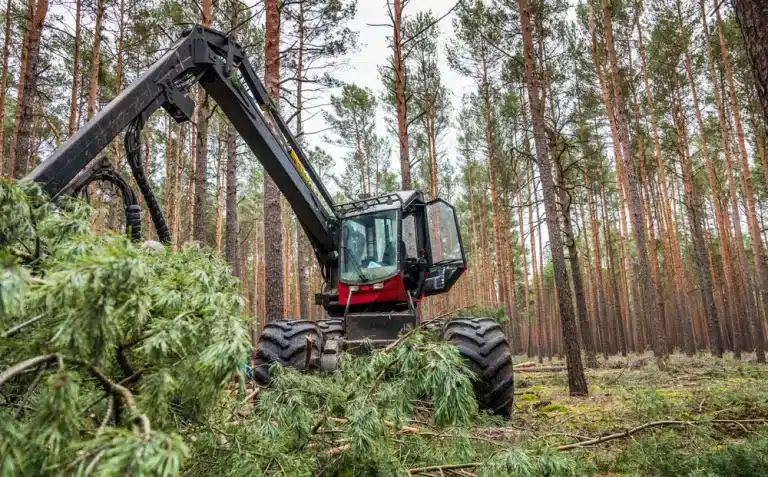Ever come up against a dreaded patch of unrelenting scrubland on your Toulouse property and thought, ‘There must be a better way to clear this’? If you’re only need it for one job, instead of buying costly equipment, renting a forestry mulcher may be the solution. In this post, we’ll look at why renting is the practical, cost-effective answer for one-off land clearing projects in the Midi-Pyrénées area, and how it can help you master your land.
How forestry mulcher rentals actually work
A forestry mulcher is a piece of equipment designed to clear, cut, and grind trees, brush and shrubs into a mulch. It’s great for land clearing, roadside or fire prevention work. You can rent these machines from equipment rental companies or dealers. Renting is easy and perfect for anyone who needs the tool temporarily or for a one-off project.
Renting is you pay to use the mulcher for a limited period, usually by the day, week or month. It’s not like you own the machine. Buying, of course, implies that you assume the expense, maintenance, and longevity. Renting is more of a short term commitment. It’s good if you only require the tool for a single project or you prefer not to plunk down a big amount all at once. Ownership involves additional responsibilities such as repair, storage and insurance that don’t exist when you rent.
For one-off projects, renting is logical. You get the right tool for the job with no big upfront cost. There’s no concern about storage for the machine. It’s a perfect match for clearing a lot, building pad and storm damage. Depending on your requirements, you can select from various sizes and models.
Securing a rental usually works like this:
- Choose the right mulcher: Decide what size and type you need for your project, such as a skid-steer or tracked model.
- Find a rental provider: Look for local equipment dealers or global firms with a good track record.
- Check rental terms: Read the contract for rental period, rates, and the fine print. Inquire about shipping, gas, and assistance if the equipment fails.
- Book and pick up: Reserve the mulcher for your dates. Grab it or have it delivered.
- Use the mulcher: Follow all safety and use tips from the rental provider.
- Return the machine: Clean and return the mulcher by the deadline to avoid extra charges.
Why mulchers matter for efficient land clearing
A forestry mulcher is an essential piece of equipment when you really require land or brush clearing in a hurry. Its powerful blades can slice, chip and pulverize trees and stumps in a single pass. That takes a ton of the time and effort of manual clearing or worse, machines that just do one task. Say, for instance, you need to prepare a site for a new building or clear trails a mulcher can do in hours what would take days by hand. It holds the ground more or less flat, so you have a nice clean site prepared for what comes next.
When you rent a forestry mulcher, that means you receive best-in-class machines without the need to purchase one. These machines are expensive easily in the tens of thousands of dollars so it’s not a good purchase if you only need it a couple times. By renting, you can choose from newer units that have enhanced safety features and more horsepower. You only pay for the days or weeks you require keeping project costs in check.
When you lease, you bypass the maintenance and warehousing nightmare. Forestry mulchers are big and require routine service, oil changes and blade maintenance. These can accumulate in time as well as money. If you’ve got the machine, you need a dry safe place to put it when you’re not using it. Rental companies manage all this, so you can focus on your project.
Accessibility as well. Rental shops can often rent you a mulcher right away, even the same day that you call. That means you don’t have to schedule weeks in advance or wait for equipment to arrive. Quick entry keeps your project on-track and allows you to complete on schedule essential for one-off or short-term work.
What renting really brings to your project
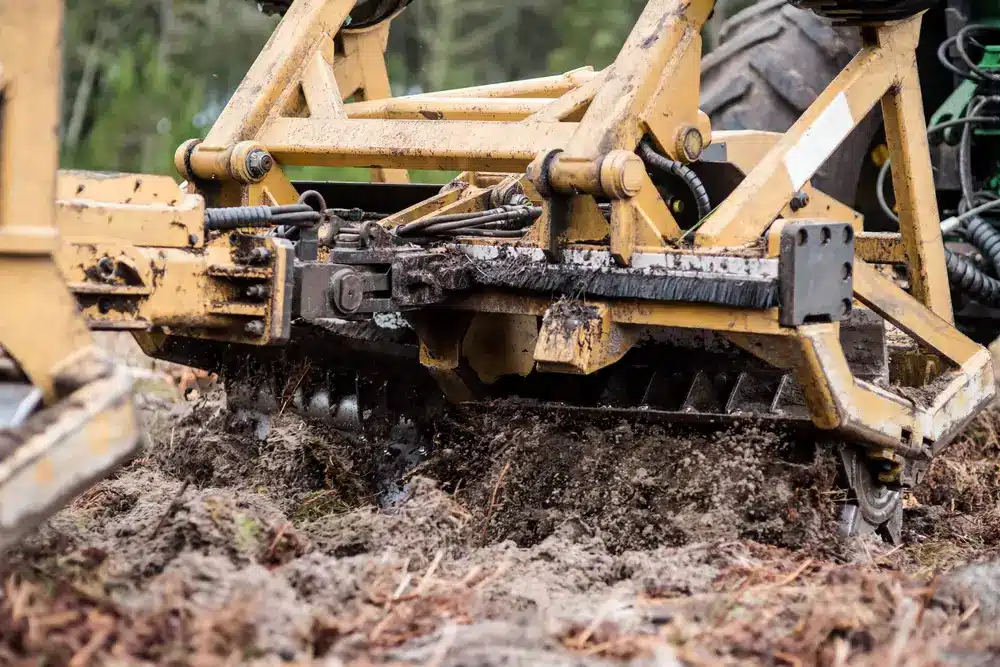
Renting a forestry mulcher offers obvious benefits for one-time projects. For one, it’s cost saving. A mulcher can run tens of thousands of dollars, for even a mid-sized model. Plus, owners cover maintenance, insurance and required fixes. These expenses pile up quick, even when the rig idles. Rental fees only pay for the days or weeks the tool is required. This optimizes the economics for small or infrequent jobs, such as clearing a site for new construction or storm cleanup.
Rental providers tend to keep their fleets fresh, so you’re getting cutting edge goodness. Newer mulchers tend to mulch more quickly, consume less fuel, and include intelligent safety design. For instance, certain models feature quick-change teeth, automatic feed controls or improved cabs for operator comfort. Lease provides an opportunity to have these enhancements cost-free. It’s convenient for squads that need to hustle or hustle less.
Renting allows project teams to scale up or down as work shifts. For example, a small landowner might require a small mulcher for a single weekend project, whereas a contractor may require multiple large units for a large scale site. Rental companies usually have lots of sizes and styles. This means users can choose the tool for the task, instead of being burdened to lug one machine around that’s too large or too small.
No concerns about shelf space, re-sale or depreciation. Forestry mulchers occupy a ton of space and depreciate rapidly without regular utilization. Rentals come back at the end of use, so there’s no shed to find or selling to handle down the road.
When it makes sense to rent instead of buy
Forestry mulcher rentals satisfies a requirement for work that only occasionally arises. Renting makes sense when buying a machine is difficult to justify. These beasts chew through brush, saplings and thick plants quick, and you can rent ’em back when the job is done.
Typical one-off projects suited for forestry mulcher rentals include:
- Clearing overgrown lots for building work or sale
- Brush and small tree clearing along fence lines or roads
- Prepping land for new crops or gardens
- Clearing right-of-way space for utilities or pipelines
- Restoring land used for mining or old farms
Seasonal and emergency use make renting savvy. During wildfire season, crews require speedier methods to create firebreaks or clear fuel. After storms or flooding, mulchers clean up fallen trees and miscellaneous debris, allowing roads to reopen or powerlines to be repaired. In snow country they can plow a path pre-winter, or after a heavy snow brings down branches.
Trail maintenance is a frequent application. Mulchers maintain walking, biking or horse trails open without a ton of hand labor. For firebreaks, a mulcher slices a broad, secure swath through brush. This prevents fires from advancing and opens up firefighter movement. For storm clean up, a rented mulcher can pulverize fallen trees and brush, accelerating clean up so crews can get to their next gig.
These tractors operate on all different kinds of property. They deal with flat fields, hills, woods or even stone terrain. Mulchers can slice through dense brush, saplings, bamboo, or weeds. That makes them suitable for a variety of uses–from parks and farms to construction and public works.
Which rental options match your job needs ?
It can make sense to rent a forestry mulcher for one-time jobs. Almost all rental companies provide daily, weekly and monthly plans. A quick clearing of a half acre might only take a day or two. Bigger sites or work that takes longer fits better with a weekly or monthly plan. The price a day goes down when you rent for a week or more. For example, a daily rental may be €300, and a weekly rate can run as high as €1,200, and a monthly rate, about €3,500. Choosing the appropriate plan can help you remain on budget and not overpay for hours you don’t use.
See what comes with your rental. Others companies drop off and pickup the mulcher on site. Others let you haul it yourself. Operator training is fundamental if you’ve never operated a forestry mulcher. Some companies offer a brief hands on experience, others might have a comprehensive manual or screencast. Support is another. Good rental companies provide telephone assistance should the unit malfunction. This can save you hours, even days, if you get stuck.
Prices and machine selection may vary by location. The table below provides some sample of what you might encounter in various regions. Real prices and inventory can change, so it’s wise to verify prior to booking.
| Company Name | Rental Duration | Price (€) | Machine Model | Availability |
| GreenHire | Daily | 320 | FAE UML/SSL 150 | In Stock |
| ForestEquipRent | Weekly | 1,250 | Seppi M. Miniforst | Limited |
| MulchPro Rentals | Monthly | 3,400 | Loftness CarbideCut | In Stock |
Insurance and liability are equally so. Most rental companies provide basic insurance, but it might not cover all damage or theft. Be sure to read the policy and inquire if you require additional coverage. This protects you from giant bills if something goes amiss.
How to prepare your rental for smooth results
Renting a forestry mulcher on a once-off project basis can be very viable and economical if you keep track of the involved parameters. In order to get the most from your rental, you need to approach it with some planning and a definitive checklist in mind touching on timing, operator training and communication with the rental provider.
First, time the rental to your project timeline as best you can. Figure out when you’ll require the machine, how much time the task will consume, and include a margin for potential delays. For instance, if you’re going to clear 2 hectares of dense brush, calculate how many man-days it would take and rent the mulcher for that time only. This prevents you from paying for days you don’t use and keeps the project costs in check.
Next, train all operators on the particular mulcher you rent. Even if you’ve used similar machines, every model has its own controls and safety process. Request manuals or quick training from the rental company, if necessary. Remind them all to use appropriate safety equipment, such as helmets and gloves, and to maintain a safe distance from the machine. Safety briefings on emergency stops, slopes/rocky ground risks and how to handle jams. For instance, never attempt to unclog clogged blades with the engine running.
Keep the rental company apprised of how the machine is operating. If you observe strange noises, leaks, or inadequate mulching, report it promptly. Most leases require you to notify them quickly or incur additional charges. They could send a mechanic or exchange the machine. Good communication prevents project bottlenecks and keeps everyone on the same page about their responsibilities.
Checklist:
- Schedule rental to project needs
- Confirm operator training and safety
- Communicate issues to rental company fast
Mistakes to avoid when renting a mulcher
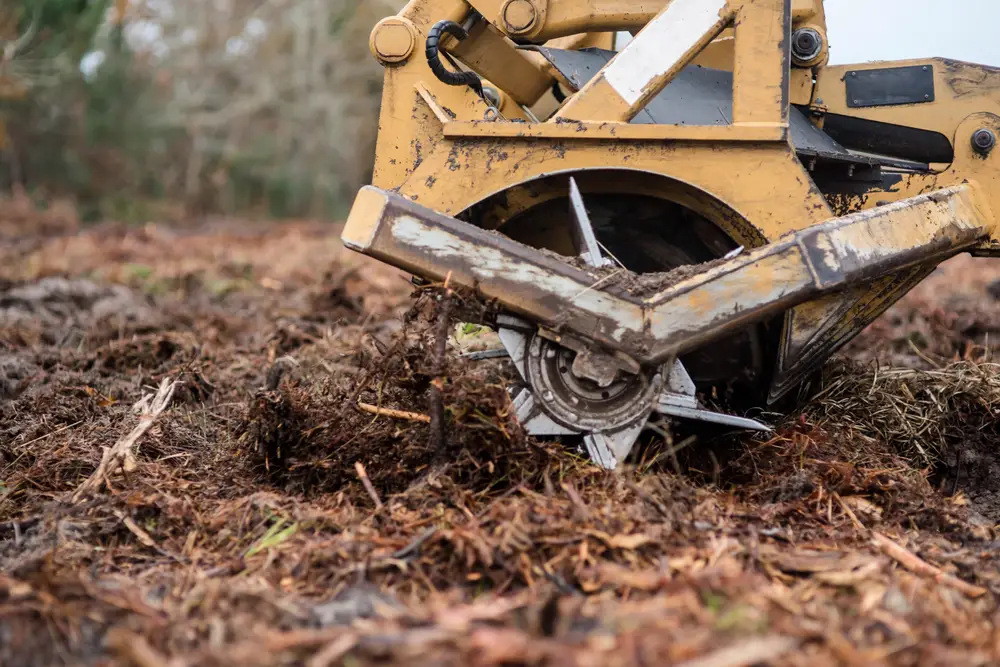
To rent a forestry mulcher for a quick job sounds easy there are common mistakes you might make that will end up costing you time and money. Being aware of red flags keeps you on-track with your project. Below is a list of do’s and don’ts to keep in mind when renting a forestry mulcher:
- Be sure to look for sneaky fees in the lease. A few rental shops tack on fuel and cleaning fees, or fees if you return the mulcher late. For instance, a few firms bill per litre for refueling. Some will charge additional if the mulcher is dirty or has debris inside. For goodness sake, get a complete cost breakdown before you ink.
- Don’t ignore the small print in your lease. Each contract is unique. Certain cover normal wear and tear, others don’t. Some make you pay for minor damage, even if you weren’t responsible. Reading the terms in full prevents surprise fees. If you’re unclear on any detail, have the rental staff explain.
- Don’t delay booking your forestry mulcher and get it early, particularly if you intend on using it during peak times such as late spring/early summer. Equipment sometimes gets booked weeks in advance. If you wait until the last minute, you won’t get the right size or type. This will cause you to have delays or have to resort to employing a machine that’s too large or small a capacity for your work.
- Don’t assume every forestry mulcher is good for every job. Consult the specs to be sure it can deal with the type and thickness of brush or trees you’re trying to clear. Choose the wrong model and you could ruin the machine or bog down your work.
How to know if the rental was worth it
Your project’s success – how well it meets its goals and stays on track determines the success of your forestry mulcher rental. Before you enter into a lease, specify what you desire to clear, the acreage you need covered, and the timing required. A good plan keeps you honest. If the work is clearing 2 hectares of heavy brush in 2 days, you’ll know if you’re behind or ahead just by measuring daily progress.
Monitor the mulcher’s operation. Measure how many hours it works non-stop and if it breaks down. A rental only makes sense if the equipment continues working. If the mulcher is out of service for repairs, that’s wasted time and money. For example, if you have to pause frequently to blow out blockage or phone for repairs, the rental rate escalates quickly.
Contrast your rental costs with alternative land clearing methods. Purchasing a mulcher, paying contractors, or forking over to hand tools can cost far more in the long run. Renting is great for one-off jobs because you don’t have to worry about big up-front costs or long-term maintenance. If you only require the machine for a week, rental is typically the less costly route.
Ask the mulcherers what they think. Operators can indicate when a machine is user-friendly or when it is prone to frequent breakdowns. Stakeholder feedback—think landowners or project managers—provides a more comprehensive view of how the rental does the job. Their feedback may inform future decisions and assist you in choosing the proper tool in the future.
